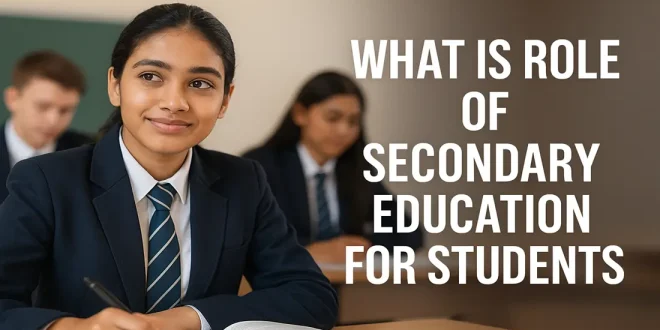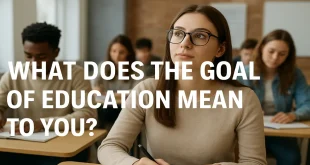Once students complete Secondary Education, they need to attend secondary school as there is a Curriculum to be followed (starting with secondary school to higher education). Students need to be able to develop a certain knowledge level as well as positive values, which will allow them to make a positive impact on challenges they may face in the real world (or whatever challenges they face). If there secondary education is not strong, students will face difficulty in pursuing higher education as well as career options.
This article will discuss the positive impact secondary education has on a student, its importance on the individual, and its impact on the broader community.
Building a Strong Academic Foundation
Secondary students learn core Mathematics in class which asserts positive growth in logical and analytic thinking, enabling one to appreciate higher education.
- Through scientific practice, the practical Execution of Theories is obtained.
- Through the Language Class, different improved levels of communication and comprehension is obtained.
- Through Social Studies students gain an understanding of the governance of society.
Recognizing these disciplines allows learners to evaluate a situation and come up with a solution on their own if need be. This foundation is essential towards continuing an education or shifting towards a specialized vocational education.
Secondary Education as a Career Pathway
Part of the responsibilities of secondary education is to prepare the students for the professional world. In this context, learners attend career orientation sessions, vocational subjects, and various extracurricular activities to help develop and nurture their skills.
- Career counselors in secondary schools help learners choose subjects that align with their desired career paths.
- Vocational education provides students with the practical skills that will enable them to join the world of work immediately after the completion of their schooling.
- The use of technology in secondary school classrooms help learners understand the contemporary workplace which is predominately digital.
All in all, the goal of secondary education is to arm learners with the necessary competencies and capabilities to navigate through life professionally in addition to the education gained on the school.
Engaging in the Development of Critical Thinking and Problem Solving Skills
Secondary education is a way of life on its own and hence should be beyond just remembering textbook work. It requires students to assess, evaluate, and reason. Through projects, debates, and research in groups, students learn the importance of questioning ideas and looking at a problem from different perspectives.
The aforementioned intellectual development allows for advanced skills refinement, which will benefit students during their professional careers. Individuals, who possess sufficient problem-solving capabilities, will have an easier time adapting to life’s uncertainties.
Shaping Social and Emotional Development
Considered to be one of the most important of aspects of personal development in secondary school, the formation and refinement of new skills is vital for success during this developmental stage. Emotional and psychological aspects, which shift, more often than not, confuse the adolescent, as do the institutional complexities of schooling.
- As such, students gain the skills associated with problem solving, as well as the more complex interpersonal and initiative skills of leadership.
- Tolerance, as well as empathy and social responsibility, also come as an outcome of interactions with people from diverse backgrounds and cultures.
- Gaining confidence, as well as enhancing discipline comes from participation in cultural activities, and sports, as well as clubs.
Those students who are not only schooled, but academically accomplished, tend to take on the responsibility of citizens, as well as interdependent individuals.
Role in Social Mobility and Equality
Holler and French argue, secondary education is one of the first steps toward disrupting the chain of inequality and poverty and is said to still be the most important. Educational opportunities, such as this, are available to underprivileged students, as secondary schooling provides.
- It is more likely for them to achieve the sought gain work opportunities.
- It is easier for them to go on to study post-secondary schooling.
- Therefore, social amenities and economic opportunities will both expand.
Thus private secondary education contributes to personal success and building of the nation and makes the society advanced.
Instilling the Lifelong Learning Through Lifelong Learning Behaviors
Self education and personal motivation usually come from secondary school. It teaches students how to remain passionate and curious for knowledge. This helps learners foster:
- Anticipation of career shifts.
- Global awareness and the need to pursue sustainability in lifestyle
- Students on finish will possess education, but will also become relevant to the world.
Contemporary Educational Settings
Noble schools serve the purpose of narrowing the digital technology gap. Contemporary primary schools, as an example, use casual speech for direct baptizing. Children are now framed in the fundamentals of computer science, are taught how to search and publish on the net, and how to use computers to communicate.
- Students who use Moonpreneurs for self-study have an opportunity to study some subjects more advanced than the traditional syllabi allow.
- Education structured in this manner teaches students who aspire to work in science and technology the STEM disciplines.
- Children are guided in the use of instruments to create structured digital designs and then to use them for cooperative projects in the classroom.
- This foundation aids student readiness for the workforce at which point they will seamlessly integrate into the economy and work in fields that need technology.
Impact on the Country’s Advancement
We can see that secondary education has a potential value for the economy and the society which also is beneficial for the people on which it is imparted. A youthful and educated population can be:
- An asset for the country’s development through the establishment and the nurturing of the industries and technology.
- Engaged citizens as they are more likely to vote and take part in the country’s activities.
- The pathways available will lead to a decreased crime rate as they will lead away from the undesirable activities.
Its value can be seen as providing secondary education will lead to more stability and progress in a country.
The Problems Faced in Secondary Education
Secondary education despite being of utmost importance faces some issues which need to be fixed in order to ensure high impact:
- Teenagers dropping out of school due to the economical or societal factors.
- Geographical differences in the education system both in urban and rural areas.
- Too many textbooks that focus more on assessments and not enough on skill development.
- Few available teachers and more resources that are more advanced.
Tackling the above problems will allow secondary education to achieve its full potential in giving every child the same opportunities.
Conclusion
Secondary education is crucial to students. It develops their skills and broaden their worldviews. It teaches students fundamentals in thinking and empowers them emotionally and socially. It readies them for the next stages of education and for the job market. It serves them and the country by enhancing cross-sectional equality, advancing the nation, and stimulating the population to pursue education even in their old age.
Secondary education is more than just a requirement; it is the building block of a more progressive future for people and the world. Its benefits extend to students, countries, and the whole world.

